
| www . ICEVI - Europe . org |  |
Volume 11 number 2, May 2005

Dear friends,
This issue of the newsletter reaches you just before we will meet for our 4th ICEVI European Conference to be held in Chemnitz, Germany, 14-18 august 2005. This conference will be an historic one. It will be the first European meeting where Europe, as the first ICEVI region to have introduced memberships, will report about the success or failure of this new constitutional duty. It will also be the first European meeting where elections for the European Committee will be held, instead of this procedure taking place during the World Conference, as happened in the past.
Because of this change in the rules, the term between elections of ICEVI Europe committee members has been necessarily shortened to 3 years. According to ICEVI rules some very experienced colleagues in the committee will not be standing for reappointment because they have already served two terms. You will find their names in the following pages as well as the names of the proposed successors for the different subregions. On behalf of ICEVI Europe, and also on my own behalf, I would like to thank all these volunteers for having devoted their leisure time to help progress the work of ICEVI in the world of visual disabilities.
I followed Herman Gresnigt as the European chairperson knowing that it would mean very hard work for any successor following in his footsteps. Being from day one without any financial support was a big challenge because from that time on we had to rely on membership fees which have proved to be until now only half successful. You may remember that the financial resources from Dutch foundations stopped when Herman handed over the chairmanship. Another challenge was finding out how things could be done by a chairperson who was still in full employment considering that a large amount of honorary work has to be carried out for ICEVI. You may not be surprised by the fact that I will not be standing for election as chairperson due to the commitments of my professional work and for my institution, the Blindeninstitutsstiftung. There is no doubt that the tasks of a chairperson demand a lot of time which should not be limited by the restrictions of other duties. I came to this decision half a year ago and I am very happy to present you with a candidate who personally and institutionally is very well qualified to lead ICEVI Europe into the future: Dr Hans Welling, Director of Visio, The Netherlands, and at present, a member of the European Committee (CV Hans Welling in this newsletter).
I would like to thank you all for your support; for many signs of friendship which I have experienced; and for the confidence which you all had in me. Continuing my work in the European Committee as the immediate past chairperson I will go on developing the European way of ICEVI with all the other members to reach ICEVI´s goal "Education for all".
Eberhard Fuchs,
Chairperson, ICEVI Europe

Through this short introduction I would like to present myself to you.
I am married and I have three adult children.
My education and professional career can be described as follows:
During my training as a social worker I worked for 1,5 years in an institution for persons with addictions.
After my graduation I began to work for a local administration institute for social services and during that time I started with my study of social sciences at the Radboud University of Nijmegen.
This experience has been very interesting and valuable, as well as the years thereafter in the field of care for mentally disabled people.
In 1975 I was appointed as director of the Royal Institute for the Education of Visually Impaired and Blind.
During the following years the developments in the care and education of visually disabled and blind people have led to the foundation of regional institutions for rehabilitation.
Both parents, children and adults have been given the opportunity to choose care and education at home, in the neighbourhood or at the institution.
Nowadays 75% of the children attend regular education and every year ten thousand clients of Visio use the regional services all over the Netherlands.
In 2005 I will resign as chairman of the Board of Directors of Visio, National Foundation for the Visually Impaired and Blind, but I hope to be able to devote myself to international projects, in particular, ICEVI-Europe.

The last meeting of this membership of the ICEVI-Europe committee was hosted by VISIO in Huizen. The three years since our first meeting, after the World Conference, just seemed to have flashed past. However, we all felt that we now knew each other so well and were sorry that this would be our last committee meeting together. As usual, there was a very long agenda. Reports were given by the Chairperson and all the regional representatives. Special mention was made of the Teacher Training Seminar which had taken place in Budapest in September 2004 (see full report under 'Teachers Training' at www.icevi-europe.org) Feedback on preparations for the ICEVI-Europe conference to be held in Chemnitz in August was given by Eberhard Fuchs and Karsten Hohler, chairperson of the Chemnitz organising committee. The preparations are going as planned; the keynote speakers have confirmed and many abstracts for papers, workshops, poster sessions and videos have been received (see further information on the conference). At the meeting Eberhard confirmed that he would not be standing for a second term as European Chairperson. He gave us the news that Hans Welling had agreed to have his name put forward for nomination for the position of Chairperson. We were all delighted and there was unanimous agreement for his nomination. ICEVI meetings are well-known for their social gatherings and we had three lovely meals in very different restaurants which illustrated the different styles and characters of local Dutch and international cuisine. The good company added to the occasion and gave us a chance to catch up with more personnel news and events after the long business sessions.
Marianna Buultjens,
Member, ICEVI-Europe Committee
The history of education of visually impaired students in Bulgaria can be divided into 3 main periods:
The pioneer and initiator of education for the blind in Bulgaria was the famous and well known Bulgarian scholar Prof. Dr. Ivan Shishmanov, who was the minister of education from 1903 until 1907. During his university studies in Germany, Switzerland and France he was deeply impressed by the institutes for the blind in these countries and was determined to start education for the blind in his native country as well. Prof. Shishmanov appointed to this crucial task Dr. Donev, who had graduated from a university in Germany and had worked for some time as a high school teacher. In July 1904 Dr. Donev attended the congress of teachers of the blind in Halle, Germany and paid a visit to the institute for the blind in Vienna. There he admired the ideas of Zeune, Klein and Alexander Mell. In the winter of 1904 Dr. Donev visited the institutes for the blind in St. Petersburg, Riga, Warsaw and Prague. After his return to Bulgaria he adapted the Braille code to the Bulgarian language.
The first school for the blind in Bulgaria, which was called the State Institute for the Blind, was opened on 1 September 1905 in Sofia. There were 11 blind students admitted in the first class and Dr. Donev was appointed as the first director (principal) of the school. In chronological order the State institute for the blind in Sofia was the 189th institute of such type in Europe.
The educational structure of the institute was organized so that it offered six academic and two professional classes. The professional classes taught the traditional jobs for blind people at that time, for instance: music, tapestry, modelling etc. In 1907 the state institute in Sofia signed a contract with the institute for the blind in Bucharest, Romania, for an exchange of students. In the nineteen twenties a big step in musical education for blind people was made in the institute. The school had a philharmonic orchestra, which was the precursor of the Sofia philharmonic orchestra. In the nineteen thirties many Bulgarian teachers did their training in Germany and France. A lot of special literature was translated from foreign languages into Bulgarian. Very good relations were established with the institute for the blind in Zemun, Yugoslavia and in 1930 its director V. Ramadanovic visited Sofia. In the thirties, the State institute proudly celebrated its first blind students being admitted to the music academy in Sofia.
The second period was a very controversial one. Success and failure followed each other. In 1946 a second special school opened its doors in the city of Varna. In 1952 without any reason the school in Sofia was moved to Varna and this caused confusion and crisis. For eleven years there were two special schools for blind children in the city of Varna, which was absurd and showed a lack of any wisdom in educational planning. In 1963 one of the special schools for blind children was moved back to Sofia, but it turned out this was not the original State institute for blind, established in Sofia in 1905, but the other school, established in 1946. This is the reason why the school celebrating its 100th anniversary is located in Varna. In 1978 and 1979 education in Orientation and Mobility and in Daily living skills started in Varna. In 1980 Mr. Peter Petrov was appointed as director of the school and for the last 25 years he has successfully led the first established school for the blind in Bulgaria. In 1982 the school started a special program in low vision training and in 1984 the first resource service for integrated education of visually impaired was opened. In 1985 the school moved to a new building
After 1989 the third and last period began. Influenced by ICEVI, in 1992 the school opened an early intervention service. In 1998 the first visually impaired multidisabled students were admitted to the school
The students in the school have access to well-designed classrooms in all academic subjects, to a computer center and a resource center for materials. At the current moment a new gym and sports center are under construction.
The school for the blind in Varna participates in many international projects such as those with Overbrook school for the blind in Philadelphia, USA, Hilton/Perkins International in Boston, USA, SENSE International in the UK and CBM in Germany.
The school for the blind in Varna welcomes its 100th anniversary as a very modern school, open to the regular schools and to society.
Prof. Dr. Vladimir Radoulov,
Bulgaria
ICEVI-Europe covers about 40 countries, grouped in 8 subregions*.
During the European Conference in Cracow (2000) each country, for the first time, elected a contact person; each subregion elected a member of the European Committee.
The same happened at the World Conference in Noordwijkerhout (the Netherlands) (2002).
The network of contact persons and committee members working together should be the back-bone of the organization.
The job description of the contact person is described in the European Newsletter in 1999:
To be honest: up to now the network of contact persons in general is not working very well: too few initiatives, too few actions, too little information, at subregional level, or at European level.
Please realise, that the job of contact person is not an honorary job, it is a job that has to be actively carried out with regard to the above-mentioned points.
At the European Conference in Chemnitz you will be asked to elect the contact person for the next period: 2005-2008. When you are doing this, please have in mind if he/she can fulfil the requirements connected with this function.
This is important for the further developments in your country, in your subregion and in ICEVI-Europe as a whole.
In the programme of the conference there will be a meeting of all newly elected contact persons. It would probably be a good idea if the contact persons of each subregion can make an appointment to meet each other, at least once, after the conference.
The European Committee, the old one and the new one, hopes for many very active and involved contact persons for the new term.
Herman Gresnigt,
Former European Chairman
* Subregions:
The 5th European conference of the International Council for Education of People with Visual Impairment (ICEVI) will be held this year in Chemnitz, Germany. The task of this conference is to establish a baseline of good practice for professionals in all countries based on cooperation with parents. The conference offers an opportunity to get informed about latest developments, exchange experiences and network with colleagues from all over Europe. Topics to be covered are: Assessment, Low Vision, Mobility and Daily Living, Professional Enhancement, Families of VI Children, Technology and Social Competence. Registration forms and more information are available from the website: www.icevi2005.de [new window].
During the European Conference in Chemnitz 2005 two business meetings are scheduled
Venue: Main Hall University Chemnitz
The subregions may feel free to nominate by election other representatives. Those subregions with several nominees will decide also by elections.
The schooling of students with visual impairments in Spain has developed over the last few years; up until the 80s, most of the students with visual impairments were educated in specific institutions belonging to the Organización Nacional de Ciegos Espa?oles (ONCE). However, at present, only 4% of the students attend these specialist schools. That is, at this time, there are about 7,500 students integrated in institutions other than those of the ONCE. Almost 50% of these students are multiple and visually impaired and they are registered in special educational institutions or in special education classrooms within ordinary schools.
The ONCE offers a broad network of specialised resources aimed at dealing with visual impairment placed at the disposal of the students, regardless of the type of schooling in which they are registered. This network is meant to complement the services offered by the public school system, and it is a part of the network of general resources agreed with the Government through agreements, contracts and special arrangements.
The main goal is to attain a higher quality of education for people with visual impairments and to guarantee their integration within the framework of inclusive education.
The ONCE has developed its own Model for providing Social Services to visually impaired persons, providing and organising the educational intervention needed by blind and visually impaired students.
The Educational Resources Centers, with their specialised educational services, which are meant to complement the resources of the regular educational system, endeavour to meet the special educational needs resulting from a visual disability. In order to do so, the necessary coordination must be established with the educational services, regional governments and other institutions, in order to complement the work being carried out in the schools, assist the families and professionals, and promote and encourage educational experiences which will enable the students to benefit from ordinary and inclusive settings.
In these Educational Resources Centers (located in Alicante, Barcelona, Madrid, Pontevedra and Seville), the necessary human and material resources can be found for the support and educational attention needed by this group of students. These Centers act as reference Centers for their urban and rural areas of intervention.
First, the educational needs of a student and the goals to be achieved are determined and duly evaluated. Then, the Specific Support Team may refer the student to one of ONCE´s schools, whenever these same goals cannot be achieved with the resources available in his or her area of residence, or would involve a serious risk of scholastic failure, or the family conditions make it adviseable.
Specific Support Teams for the Educational Attention to be provided to Individuals with Visual impairments
The Specific Teams for the Educational Attention to individuals with visual impairments are dependent upon the Educational Resources Centers within a basically provincial geographic area. In all the Spanish administrative provinces, collaboration agreements exist between the ONCE and each Educational Administration or Department, regulating the functioning of these Specific Teams.
These Teams pay special attention to all those individuals with a visual acuity of less than 1/10 or a reduction in their visual field of 90%. As an exception, in accordance with the educational needs which each student presents, those students with a visual acuity of more than what has been previously established by the regulations will be attended to, as long as it does not exceed 3/10.
Within the framework of the ONCE's Model for Providing Social Services, steps will be taken with the students as a result of the formulation of an Individualized Education Plan (IEP) (in terms of the student's specific needs), which will be defined by the user and his or her family.
The main goal of the intervention on the part of the Specific Team is to achieve the effective integration, inclusion and normalisation of students with visual impairments in all the areas of their lives, for which specialised technical advice will be provided, aimed at all the agents of the educational community.
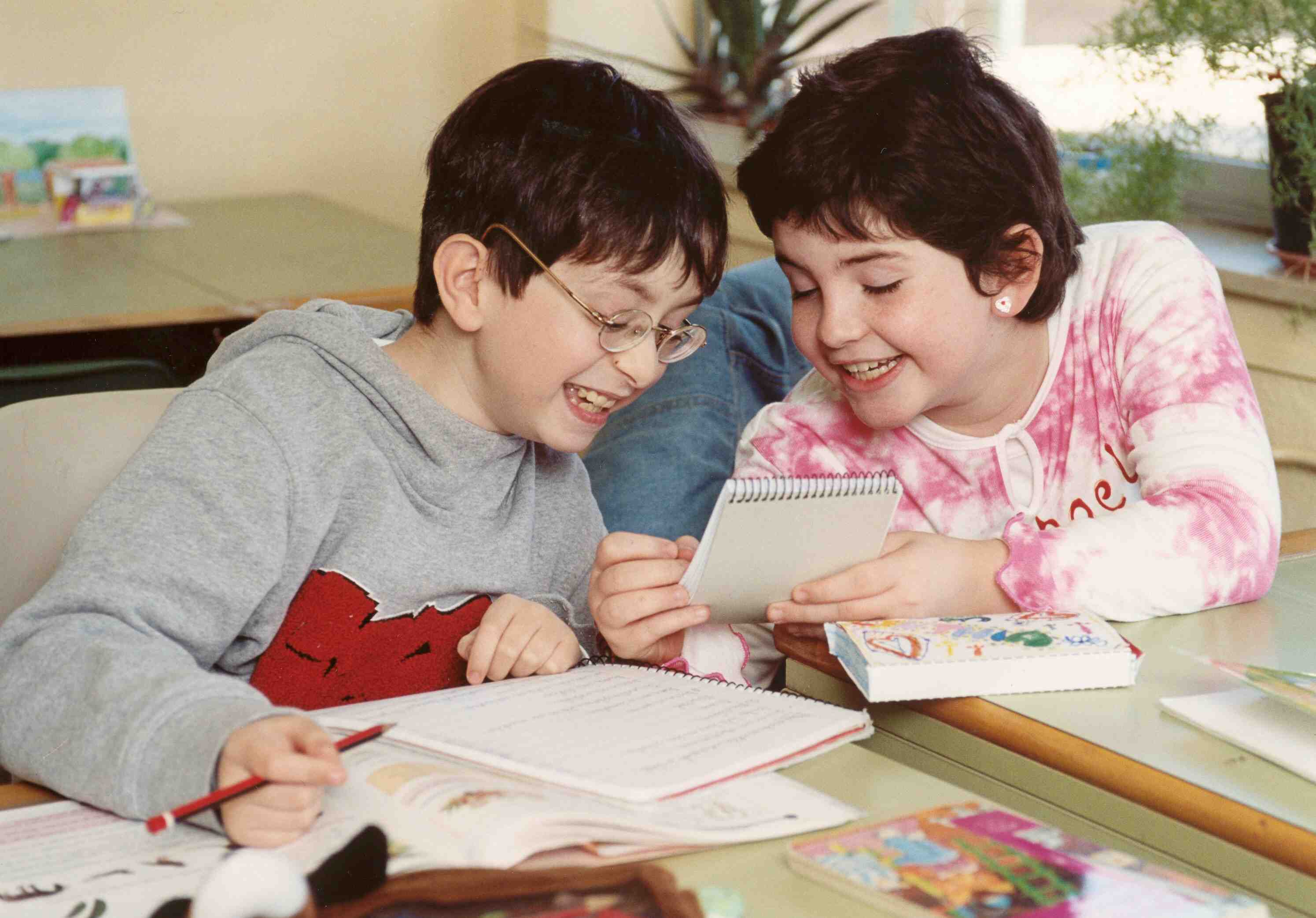
The attention to be provided will begin with the social worker getting to know the student and his family, so that an initial evaluation can be made of the student's needs in terms of his age, his visual impairment, his curricular competency, the characteristics of his surroundings, etc.
The Individualized Education Plan (IEP) is thus established: a decision is made as to what type and frequency of direct support and attention will be required by the student, in his school, and from the teacher or tutor of the Team. This support teacher or tutor will be a specialist in visual impairment and will work directly with the student on aspects specifically related to his visual impairment, in order to assure that he is in an ideal position to take full advantage of his school programme (we are talking about techniques in independence, orientation and mobility, daily living activities, cane techniques and skills, use of optical aids, etc.). This attention is not meant to replace, in any way, the classroom teacher, but is meant to complement him/her. We will furnish the necessary resources so that the visually impaired student can be fully integrated in the classroom and can keep up with the regular rhythm and dynamics of the class. Thus, for example, classroom textbooks, notes and examinations will be provided in Braille or other tactile formats. The specific techniques for teaching individuals with visual impairments will be explained to the tutor, together with the usefulness of the materials and the way to use them and any other additional explanations which might be necessary: the need to make more frequent and specific verbal statements, the importance of maintaining order in the classroom, the importance of avoiding the tendency to overprotect the student, etc.
When dealing with a child with visual difficulties we may tend to think more about what they are not capable of doing than what they can. Education must begin by considering their potential, while respecting the specific nature of their blindness. It is a matter of giving an individualised response to the educational needs which we all have.
Teams are made up of several professionals who work in a coordinated manner in order to achieve the very best results. The members are:
The main goal is to furnish the student with the attention he requires, through specialised intervention in the specific areas related to visual impairment, so that he can acquire independence and responsibility in his work, by encouraging appropriate work and study habits.
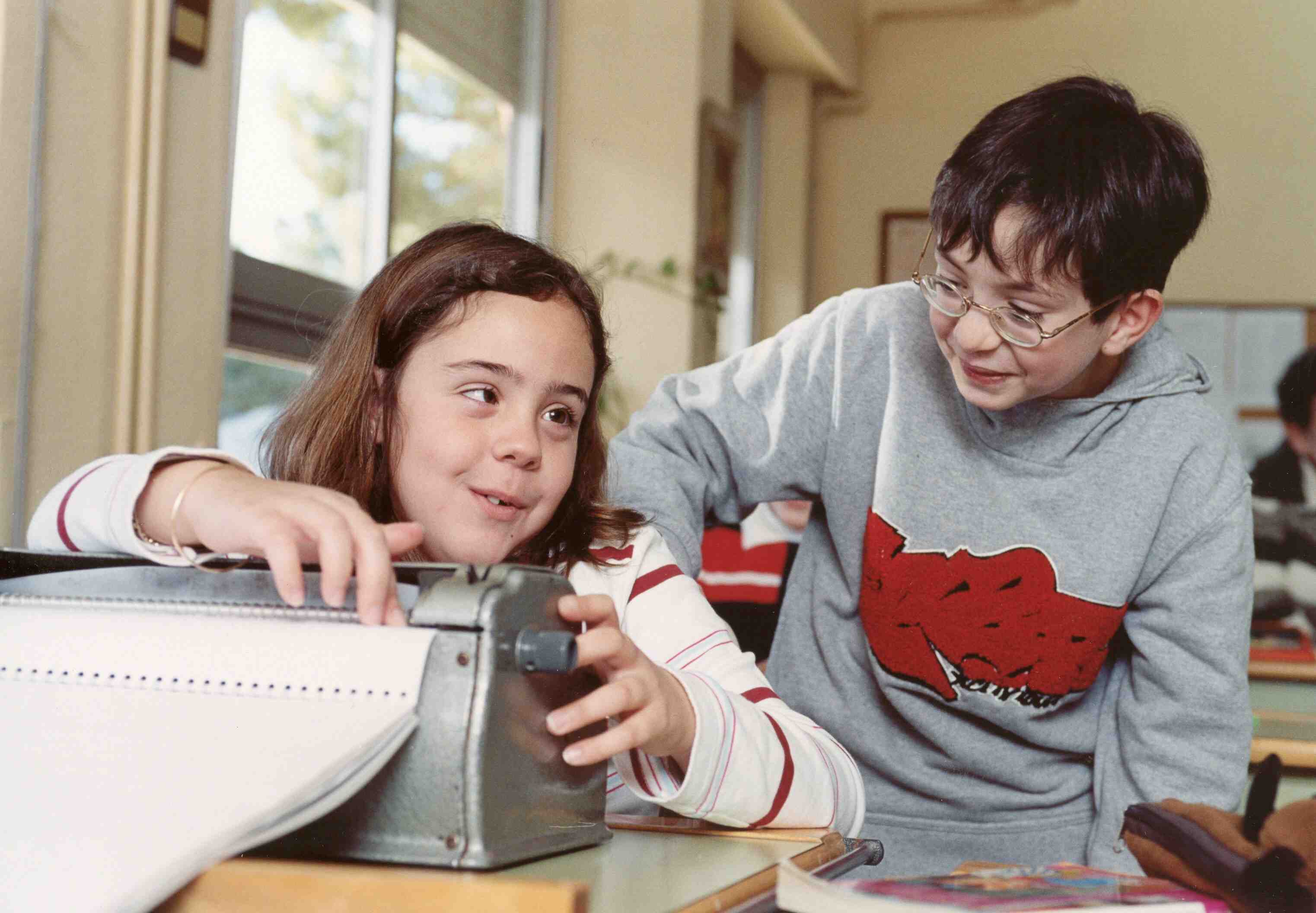
It is also necessary to specifically reinforce certain curricular areas, such as the plastic arts, mathematics, music, physical education and technology, due to their particular complexity in the adaptation or use of special materials, their didactics and their methodology.
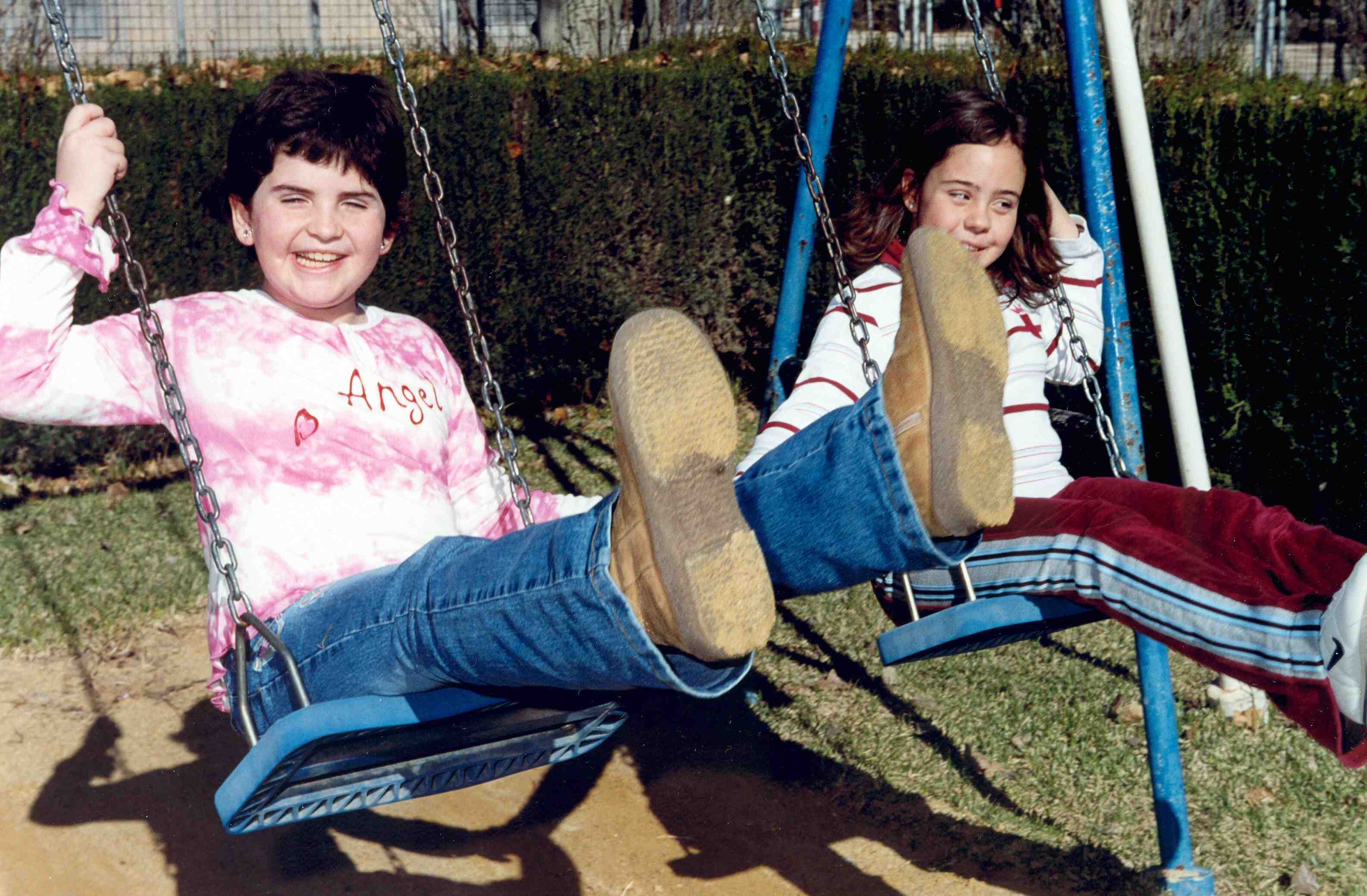
It would be wise to suggest activities for leisure time which would be organised in the surroundings and encourage their participation. It is also advisable to encourage the integral development of the student within his closest social context through joint experiences and encounters, and reinforce his relationships with his classmates and with other children with visual impairment, in view of the need to have several different reference groups.
In general, the introduction of a student with a visual impairment into an ordinary classroom should not entail any great difficulties. The student will require specific attention and a series of necessary human resources and materials so that he can be integrated into the classroom and follow the school dynamics. The Specific Team, then, should inform, advise and support the educational institutions into which the students are integrated. It is necessary, first of all, to make the educational community aware of the need for the student's integration and inform them of his characteristics and needs. Information should also be provided as to the necessary support.
By means of this advisory process, information will be provided as to the adaptations of the study area which the student will need, as well as the selection of the reading and writing code (Braille or ink) most appropriate or the location of the student in the classroom, in terms of his specific needs.
In addition, the material the student requires will be adapted in the classroom and the school teachers will be advised as to the elaboration and use of these specific materials and the determination of his needs. The specific teaching techniques for individuals with visual impairment and their unique learning characteristics will be explained. The classroom teacher should be familiar with the resources available and the use of the didactic material, from the rubber laminas used to obtain on the spot relief drawings to the more sophisticated apparatus for accessing information.
The Team should make the entire staff of teachers aware of the fact that by making use of the necessary adaptations, it will be possible to respond to the student's needs.
It is also important to work in a coordinated manner with the guidance staff and with the Specific Teams in order to make the appropriate evaluations and decide jointly on the areas of intervention required within the school sphere and to determine the educational institution which best meets the needs of the students. Furthermore, there should be the necessary collaboration in all the educational and orientation activities.
The school should be given sufficient information in order to facilitate the process of admitting the students, by providing advice as to their specific needs and the educational implications, and the type of intervention which will be provided and by helping to eliminate any barriers which can make their integration more difficult.
The Specific Teams will attend to students at all of the educational stages: from Pre-School up to the University. It is important to highlight the importance of providing early attention to infants with visual impairment, as a way to prevent any disruptions in their development in any sense.
The families are the true agents in the integrating process of their children, and so it is necessary to provide special orientation and advice in order to encourage the process of accepting their child's visual disability.
It is a matter of giving the family, which has the main responsibility for their child's education, information relating to the disability and to the assistance available in order to reinforce the personal resources needed for raising their child, because his or her integration depends upon it.
Information is also provided on the most significant aspects in the child's development: the stage of development, the existing resources, technical aids and all those specific aspects of the visual disability which must be encouraged: the process of socialisation, independence, acquiring of a positive self esteem, acceptance of the disability, visual stimulation, etc. It is also necessary to reinforce the family's relationship with the school. In addition, information will be provided on scholarships and financial assistance from the ONCE and other resources outside of this Agency.
It is a matter, then, of providing the parents with a place where they can express their doubts, problems and fears and where they can receive the emotional support necessary. In order to do so, the Specific Team must organise special areas for attending to the families and programme specific activities for them: schools for parents, learning workshops, etc. and encourage the participation of these families in other forums.
Social relationships are a key factor in the creation of the individual's identity, and so the actions taken in this sphere will be of central importance.
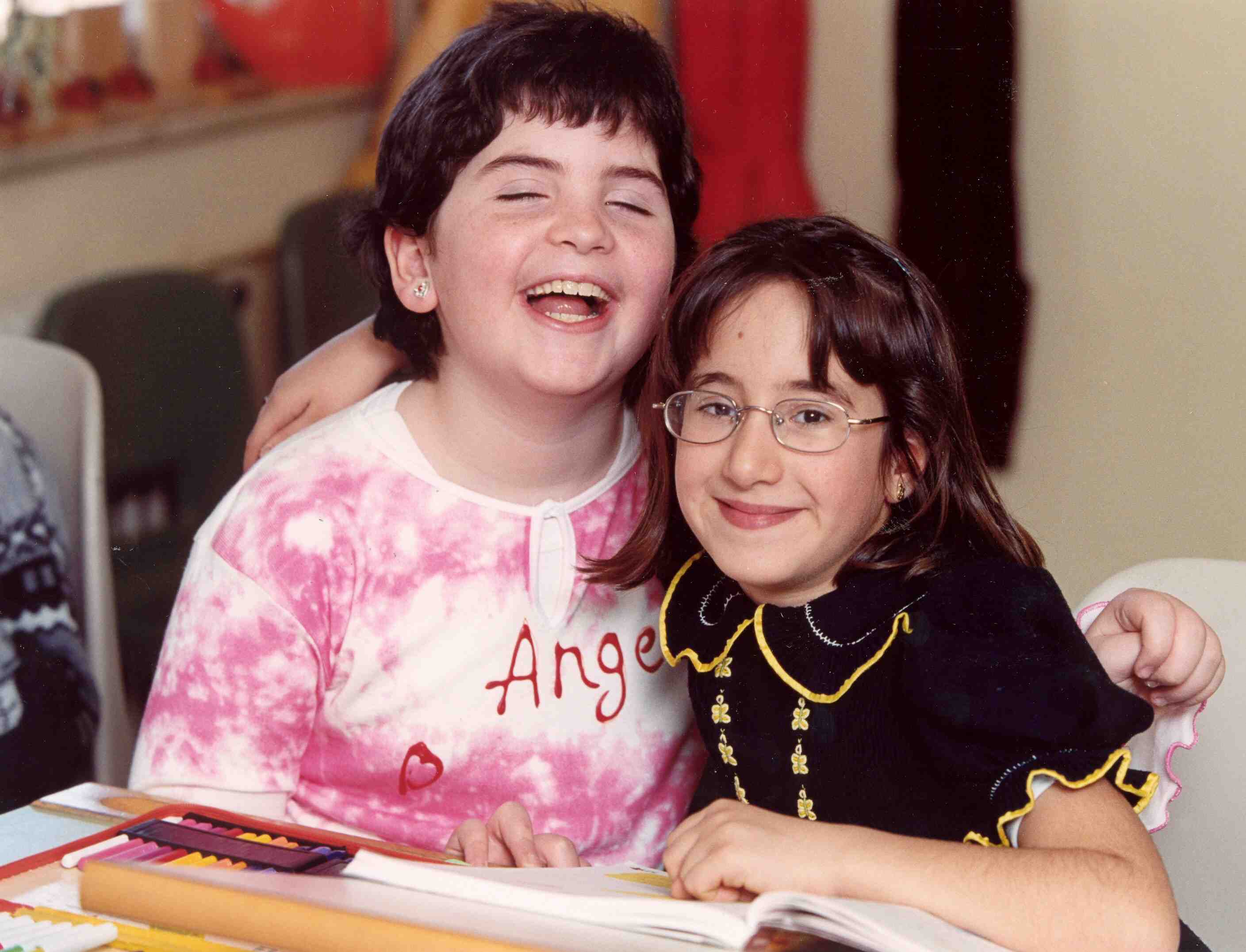
The way the student adapts, interacts and adjusts can reveal certain maladaptive behaviour due to a lack of visual learning of the appropriate behaviours. Therefore, in view of the importance of interaction for personal identity and social inclusion, it is absolutely necessary to work on these aspects, and even train the youngest children in the basic social skills and habits, which cannot be learned through imitation and which would facilitate their relationships with other people and with society in general.
In order to facilitate a normalised growth and development in these aspects, the student must have several reference groups. In fact, it would be a good idea to organise group activities in which other individuals with visual impairment would participate, which would allow the student to create bonds, identify himself with others...
Furthermore, it is necessary to support the tutor and all the professionals involved and make them aware of the importance of encouraging and facilitating social relationships.
Luz Laine Mouliaá,
Director of Education, O.N.C.E.
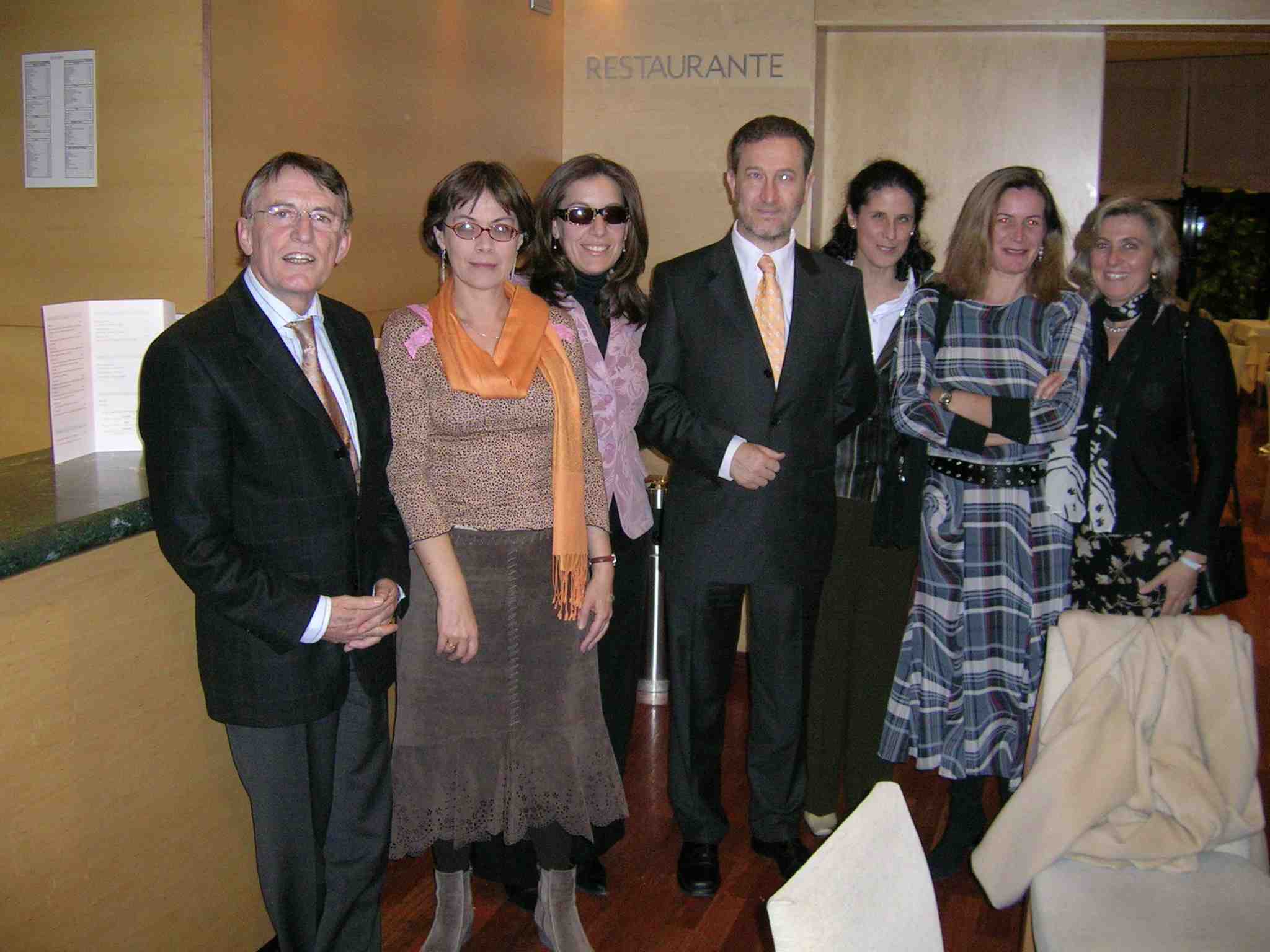
The annual meeting of the ICEVI Executive Committee was held in March 2005 in Madrid, Spain, hosted by ONCE. An important issue for discussion was the ICEVI World conference to be held in Kuala Lumpur in 2006. The Malaysian hosts of the conference presented a remarkable overview of the state of the preparations.
Eberhard Fuchs
European Chairperson
Go to www.icevi.org for news [new window] of Events, Contacts, Projects, Publications and an update on the 12th ICEVI World Conference to be held in Kuala Lumpur, Malaysia 6-21 July 2006
This full report is available at www.icevi-europe.org on the Home page at 'Teachers Training'. The full text of all opening Keynote and plenary speeches are included. The full text of papers given during the meetings of the topic groups, along with detailed reports of discussion that took place, are all available. The groups are numbered 1,2,3, and 5. This is because originally there were 5 topic areas, but this was reduced to 4, with the original topic 4 being omitted.